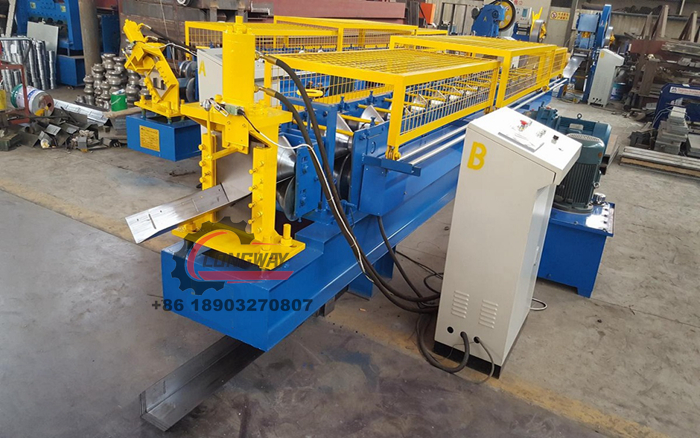roofing tile roll forming machine factory
The Significance of Roofing Tile Roll Forming Machine Factories
In the construction industry, roofing materials play a vital role in ensuring the durability and aesthetic appeal of buildings. Among these materials, roofing tiles are particularly esteemed for their robustness and longevity. To meet the growing demand for high-quality roofing tiles, the role of roofing tile roll forming machine factories becomes increasingly significant. This article explores the vital functions of these factories, the technology behind them, and their impact on the construction sector.
The Technology Behind Roofing Tile Roll Forming Machines
Roofing tile roll forming machines are specialized equipment designed to manufacture metal roofing tiles of various profiles and designs. The process typically involves feeding a continuous strip of metal, often pre-coated steel or aluminum, into the machine. The machine then shapes this metal into the desired form through a series of rollers. This method, known as roll forming, is highly efficient and allows for the production of tiles with precise dimensions and minimal waste.
Modern roll forming machines are often equipped with advanced technologies, such as computer numerical control (CNC) systems, which ensure high accuracy and repeatability in production. This level of precision is critical, as roofing tiles must fit seamlessly to provide effective weather resistance and structural integrity. Moreover, the ability to quickly switch between different tile profiles enables factories to cater to diverse customer needs, from traditional to contemporary designs.
The Manufacturing Process
The production of roofing tiles in roll forming factories involves several steps. After the metal coil is fed into the machine, it undergoes a series of pre-processing treatments, including cleaning and coating. This ensures that the metal is free from impurities and ready for rolling. Once the metal passes through the series of rollers, it is cut to standard lengths using a precision cutting mechanism. The result is a set of uniform roofing tiles that are ready for shipment.
These factories also prioritize quality control throughout the manufacturing process. Regular inspections and testing are undertaken to ensure that the final products meet industry standards for durability, resistance to corrosion, and aesthetic appeal. This commitment to quality not only assures customers but also builds a factory's reputation in the competitive market.
Advantages of Roofing Tile Roll Forming Machine Factories
roofing tile roll forming machine factory

2. High Output These machines can produce a large quantity of tiles in a short period, fulfilling the demands of large construction projects efficiently.
3. Customization With the ability to manufacture different styles and profiles, factories can meet specific client requirements without significant downtime for reconfiguration.
4. Durability The use of high-quality metals and protective coatings results in roofing tiles that are not only visually appealing but also capable of withstanding harsh weather conditions.
5. Sustainability Many manufacturers are now focusing on sustainability by using recycled materials and environmentally friendly coatings, aligning with global efforts to reduce carbon footprints.
The Impact on the Construction Sector
Roofing tile roll forming machine factories have a profound impact on the construction industry. As the demand for sustainable and durable building materials grows, these factories play a crucial role in supplying high-quality roofing solutions. The efficiency and output capabilities of roll forming machines allow for rapid responses to market demands, helping builders complete projects on time.
Moreover, innovations in roofing materials have led to improved insulation and energy efficiency in buildings. This not only enhances the comfort of occupants but also aids in reducing energy consumption, contributing to a more sustainable future.
Conclusion
In summary, roofing tile roll forming machine factories are integral to the construction industry. They leverage advanced technology to produce high-quality roofing tiles that meet diverse customer needs. The efficiency, cost-effectiveness, and customizability of these machines position them as invaluable assets in ensuring that the roofs of our buildings are durable, aesthetically pleasing, and environmentally friendly. As the industry continues to evolve, these factories will undoubtedly play a pivotal role in shaping the future of roofing solutions.
-
Roof Panel Machines: Buying Guide, Types, and PricingNewsJul.04, 2025
-
Purlin Machines: Types, Features, and Pricing GuideNewsJul.04, 2025
-
Metal Embossing Machines: Types, Applications, and Buying GuideNewsJul.04, 2025
-
Gutter Machines: Features, Types, and Cost BreakdownNewsJul.04, 2025
-
Cut to Length Line: Overview, Equipment, and Buying GuideNewsJul.04, 2025
-
Auto Stacker: Features, Applications, and Cost BreakdownNewsJul.04, 2025
-
Top Drywall Profile Machine Models for SaleNewsJun.05, 2025








